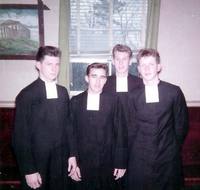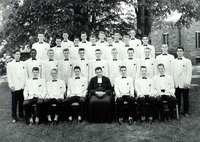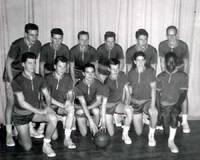Obituary-Thomas Peter Mullen
Received the Breath of Life
abt 1944 — Bronx NY
Called to Accept the Marist Brotherhood
1962 —
Graduated Marist College 1966
Married Denise Duffy
1971 — Miami FL
Was Commended to God
3 Sept 2008
Miami Florida
Interment
?
THOMAS P. MULLEN, 64
Social worker aided mentally ill offenders
Posted on Sat, Sep. 06, 2008
BY ELINOR J. BRECHER AND CAROL MARBIN MILLER
Thomas P. Mullen, the one-time Marist Brother and social worker who founded the Passageway Program -- a Miami halfway house for mentally ill offenders -- has died unexpectedly at 64.
Friends found his body Wednesday at his Miami Beach apartment, said son Daniel Mullen of California . Although foul play isn't suspected, an autopsy is being performed.
Mullen was revered in South Florida mental-health circles and beyond for his dedication to a widely reviled population: defendants found not guilty by reason of insanity who had been released into the community from psychiatric hospitals or treatment centers, most with a paranoid schizophrenia diagnosis.
IDEALIST AND CYNIC
To his endeavor, Mullen brought the social conscience of a 1960s activist. Influenced by the pacifist Catholic Worker movement of the mid-20th century, he nonetheless wore the cynicism and irony of a man accustomed to battling prejudice and bureaucracy.
Abuse of power infuriated him, and he ultimately rejected organized religion as ''delusional,'' said Passageway's CFO, Federico Hirlemann.
Before Mullen established the program in 1979, such men and women had nowhere safe to live and their distraught families had nowhere to turn.
Miami Dade College lawyer Carmen Dominguez, a former mental-health administrator for the Department of Children & Families, which funds Passageway, said Mullen fought for them all, without the relative advantage of having sympathetic clients.
"These were the criminally insane. It's not as if you could go out and have fundraisers.''
Run out of several locations by angry neighbors, Passageway found permanent quarters near Jackson Memorial Hospital in 1993, thanks in part to then-State Attorney Janet Reno, who helped raise money and calm nervous politicians.
''Tom made it his mission to give these souls an alternative to an unending cycle of homelessness and jail,'' said defense attorney Mel Black, a former Passageway board member. "He was truly his brother's keeper.''
''He always cared about the disadvantaged -- people who . . . were suffering due to circumstances beyond their control,'' said Daniel Mullen, a political consultant.
Mullen knew the feeling. Daniel said that he ''had no control over his loss of his father,'' a 49-year-old firefighter who drowned during an ocean fishing trip, his body never found, when Mullen was 15.
Miami-Dade County Judge Steven Leifman, who presides over the county's Mental Health Court, said Mullen ``could be a pain in the neck, but . . . ran a program that really is the ideal model for people who are this sick. He watched them like a hawk. He just made sure these people had housing, shelter, opportunities to recover, took their medication and got the help they needed.''
''Tom is like a father to all of them,'' Hirlemann said. He was overwhelming successful, said Terry Chavez, Hispanic Media Relations director for the Miami-Dade state attorney's office. ''His program is about the only residential facility that my office has ever agreed -- with little or no hesitation -- to allow defendants with serious criminal charges to go for treatment,'' she said.
CAME IN 1970S
Tom Mullen, from a Bronx housing project, came to South Florida in the early 1970s. A Marist College graduate and member of the religious order that founded it, he earned a master's degree in social work at Barry University and taught at Columbus High School.
In 1971, he married Denise Duffy of Miami. They divorced in 1989.
Mullen hailed from a conservative Irish Catholic family, but according to his son -- named for the Jesuit priest and Vietnam-era peace activist Daniel Berrigan -- ''started to see the world differently'' following the church's mid-1960s Vatican II reforms. ''His politics changed from conservative to liberal,'' and he left his order.
In Crazy: A Father's Search Through America's Mental Health Madness (Putnam, 2006), former Washington Post reporter Pete Earley wrote that Berrigan convinced Mullen to 'put his life `at risk' in service to his faith. Mullen quit his job, returned to New York, and began working in soup kitchens. Two years later, the archdiocese in Miami recruited him to run a methadone clinic.''
He ''proved difficult to control,'' Earley wrote. He was letting social workers talk to pregnant drug abusers about abortion.
After the archdiocese took, then returned, a federal grant for a halfway house, Mullen teamed with Black to start his own operation.
In addition to his son and brother Michael Mullen, a Supreme Court justice in Suffolk County, N.Y., Tom Mullen is survived by brother John Mullen of California. His first grandchild is due in four months.
Funeral arrangements are pending.
Comment by John E. Smith '61 who also alerted us to the Miami Herald article on Tom Mullen
In the early 1970s, Tom was the first of four former Marist Brothers I asked to work at the St. Luke's Methadone program here in Miami. (Others were Ray Armstrong, Mike Goldrick and Don Harrow.) Tom later went on to become the program Director, and after that the Director of an Ex-Felon program, run under the auspices of the Archdiocese of Miami. He later founded Passageways as noted in the obit.
Source: Original Marists All Site
Marist College | Marist Archives & Special Collections | Contact Us | Acknowledgements



